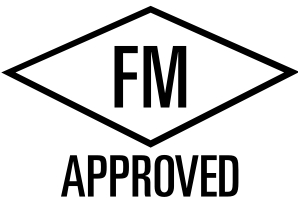What Is FM Approval?

Figure 1: FM approved certification
The FM Approval is a product certification that is a globally recognized benchmark signifying the product's adherence to rigorous testing and standards for loss prevention. It is provided by FM Approvals, a member of the FM Global Group. It acts as a stamp of assurance, signifying that a product is safe, reliable, and high quality. The FM APPROVED mark is recognized and respected worldwide.
Where is FM Approval used?
Industries
FM certification is particularly significant in high-risk environments with prevalent fire hazards, explosions, and other potential risks. Some of the key industries that require FM Approval include:
- Manufacturing facilities:
- Chemical plants
- Petrochemical refineries
- Pharmaceutical manufacturing facilities
- Warehousing and distribution centers:
- Storage facilities for flammable materials
- High-pile storage warehouses
- Power generation and utilities:
- Power plants
- Electrical substations
- Electronics and telecommunications:
- Data centers
- Telecommunication facilities
- Automotive and aerospace:
- Automotive manufacturing plants
- Aerospace manufacturing facilities
Products
Some common devices that often seek FM Approval include:
- Fire protection systems (sprinklers, extinguishing systems)
- Industrial machinery and equipment
- Electrical and electronic devices
- Storage racks and shelving systems
- Building materials and construction products
- Safety equipment (safety cabinets, safety storage containers)

Figure 2: Fire alarm systems in industrial settings typically require FM Approval to ensure their electronics will function in the case of a hazardous emergency
FM Approval guide
Obtaining FM Approval for a product involves a step-by-step process that requires close collaboration with FM Global and its team of experts.
-
Request from the manufacturer: The manufacturer initiates the process by requesting FM Approvals, seeking approval for a product or assembly. The request includes details such as:
- Location
- Scope of work
- Model numbers
- Specifications
- Relevant sales literature
-
Proposal and authorization by manufacturer:
- FM Approvals responds by sending a proposal letter to the manufacturer. This letter outlines the cost estimates, rough schedule, scope of work, required tests, and sample needs. Also, they send a one-time contractual master agreement for new customers.
- The manufacturer then gives written authorization for the proposal and submits all the requested materials and information as specified.
- Review, testing, and initial audit: FM Approvals create drawings or specifications to compare with the products. They schedule and conduct testing if they have received all the required items. In the case of a first-time customer or a new manufacturing location, an investigator visits the customer's facility to review quality control procedures before FM Approvals grants product approval.
-
The report, FM APPROVED mark, and listing:
- Upon successful completion of testing, a report is developed and reviewed for quality and technical accuracy.
- Depending on the customer’s instructions, samples are either retained and archived, returned to the customer, or disposed of.
- FM approval sends the final report to the manufacturer. The approval takes effect from the date of the report.
- The manufacturer can then mark the product as 'FM Approved.' Also, the product is listed in the Approval Guide (FM Approvals' online resource).
- Surveillance audits: Surveillance audits of the manufacturing facilities are mandatory to maintain the FM Approved status. FM Approval involves continuous monitoring to ensure the approved products maintain their safety and performance over time. Ongoing audits by FM Global help to verify that manufacturers are consistently meeting safety standards, assuring consumers that the product's quality remains reliable throughout its lifespan.
Timeframe for getting FM approval
The timeframe for obtaining FM Approval can vary depending on the complexity of the product, the availability of testing facilities, and the thoroughness of the initial documentation. Generally, the process can take several weeks to months, especially if modifications and retesting are required.
FM Approval vs ATEX certification
FM Approvals
- A certification body that is part of the FM Global Group, a U.S.- based insurance company.
- Provides international certification for industrial and commercial products demonstrating high safety standards.
- Primarily recognized and used in North America but accepted worldwide.
- Focuses on reducing property loss through rigorous testing and objective scientific research.
ATEX
- A European directive ensuring the safety of equipment used in explosive atmospheres within the European Union (EU).
- The ATEX directive is legally binding in EU member states.
- Requires manufacturers to guarantee their products are safe to use in environments prone to igniting explosive gases or dust.
Choosing between FM Approvals and ATEX
If the equipment is intended for use within the European Union, it must comply with the ATEX directive. Conversely, equipment should ideally be FM Approved for North America and other regions that recognize FM Approvals. Sometimes, a product might need to meet both FM Approvals and ATEX standards to cater to a global market.
FAQs
What is the meaning of an 'FM approved' product?
'FM approved' refers to a product tested, evaluated, and certified by FM Approvals, an independent testing organization, to meet specific safety, quality, and performance standards.
What is an FM approved pipe and pressure relief valve?
An FM approved pipe and pressure relief refers to pipes and pressure relief valves certified by FM Approvals for meeting safety and performance standards.



